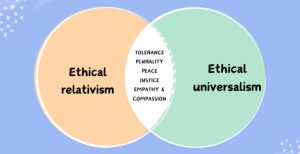Even though Morality on the other hand has relative character as it depends upon individuals & Ethics on the other hand is based on established universal standards, certain principles bridge the gap and find significance in both the perspectives.
Values like tolerance, plurality, empathy, peace, and justice serve as common ground. Universalism embraces these principles as globally applicable, emphasizing their importance in human lives. On the other hand, relativism recognizes the value of these principles within specific societal structures, acknowledging their role in shaping diverse moral perspectives.
Example: JUSTICE

Ethical relativism:
Many tribal communities in India have their customary justice systems. One unique ritual among certain tribal communities in India related to justice is the “Jallikattu” or “Manju Virattu,” practiced in some parts of Tamil Nadu, particularly by the Paliyan tribal community. In certain instances, disputes within the community are brought to the Jallikattu arena. Participants or community members involved in the conflict may voluntarily participate in the event. The resolution is symbolic, with the idea that facing the challenge together in the arena helps settle the dispute.
Ethical Universalism:
Globally, principles of justice are often enshrined in legal systems and international agreements. Concepts like equality before the law, fair trials, and protection of human rights are considered fundamental to justice.
Common ground is justice
The overarching principle of justice, ensuring fairness, equity, and resolution of disputes, is evident both in tribal societies and global legal frameworks. While specific practices differ, the fundamental aim is to maintain social order, address grievances, and uphold a sense of fairness within the community or society.
In nutshell, people cannot adhere to ethical standards if they do not adhere to some moral standards. Moral standards of society are strong determinants of standards of ethics in practice. While individuals have the freedom to hold diverse values and beliefs, the morality of those values is often influenced by ethical considerations. So, it can be said that ethical universalism rests at the foundation of ethical relativism.

Spread the Word




